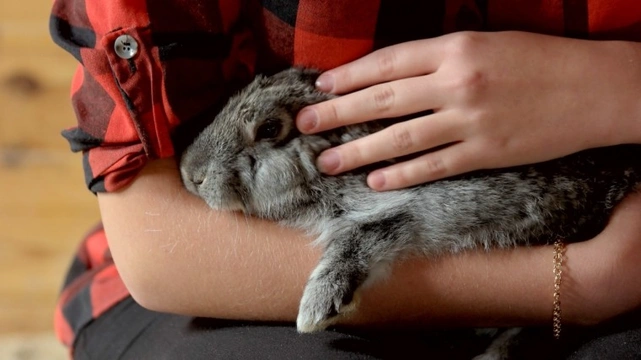
Do rabbits make good pets for children?
The short, simple answer to this is no! In fact, rabbits are not really a good pet for even a lot of adults who might think them a viable choice, and this is because rabbit care and the traits of the rabbit itself are far more complex and challenging than most people realise until they begin to do their research.
A rabbit doesn’t make for a good pet for a child if the child is young, or even for older children if you intend to have your child take care and responsibility for the rabbit in whole or in the main.
In fact, a rabbit is only a good pet for a child with appropriate adult supervision and care, which in turn, can only happen if you as the parent, adult, and holder of the responsibility for the pet really understand what rabbit care involves and are able to provide it.
If you’re willing to be the owner and carer for the rabbit both on paper and in reality, and want to get your child of any age involved in this with the proper supervision and education of what this entails, this is totally fine.
But if you’re looking for a cheap or easy pet, or one you as the parent or pet owner won’t have to spend a lot of time on or have a lot to do with? A rabbit is not for you. This article will tell you why rabbits don’t make good children’s pets per se. Read on to learn more.
Rabbits have complex care requirements
Rabbits! Feed them once a day, clean the hutch out once a week, child picks them up and strokes them for half an hour when they get home from school – job done, right? Very, very wrong.
Rabbits need quite a lot of attention to be paid to their feeding and dietary requirements, and they’re also animals that eat messily and don’t pay much mind to where they toilet, but that also need to live in very clean housing to keep them healthy and avoid attracting vermin. This means they need their housing cleaned out daily and thoroughly emptied and scrubbed out weekly, just for starters!
If you want your rabbit to be tame, it will also need lots of daily attention. And if you’re not bothered about the rabbit being tame (and why would you want a rabbit at all if so?) then your rabbit will still need plenty of stimulation, toys, time moving around freely, and things to do.
They can be tricky to feed
Readymade rabbit feed mixes are a part of the diet of most rabbits, but this alone is not enough. Rabbits also need hay (of a specific type and quality), as much grass as possible with hay ideally used supplementarily, and a range of fresh, clean veggies – but only certain ones, and never scraps or waste food.
Feeding a rabbit has far more to both the planning and prep of things than just pouring a bag of food into a bowl once a day, and this can be challenging for adults, never mind kids, to understand and keep on top of.
They need very careful, gentle handling
Rabbits are fragile animals, and they can be hurt accidentally quite easily; and if they panic or struggle, they may harm themselves trying to escape.
Coupled with this, as a prey animal rabbits often hide signs of pain or illness, and so neither you nor your child would necessarily realise if your rabbit was uncomfortable or disliked the way you were holding them.
They don’t like being picked up
Rabbits don’t actually like being picked up; they’re ground-dwelling and burrowing animals, who don’t climb or seek out high ground. This means that both being off the ground and being lifted itself is unnatural to them and can be very distressing; and would only happen in the wild if they were caught by a predator.
Children naturally want to pick up their pet rabbits, and while this is not necessarily going to be a blanket “no” for a responsible child who understands how to do this and is supervised properly and with a rabbit that is used to being handled and ok with it, bear in mind that being picked up is actually a Big Deal for rabbits and not something to take lightly.
Also, children tend to like to show their pets to their friends, and other children will also often be keen to hold and pet the rabbit too; and being passed around, being crowded, or being handled improperly by mistake will all make rabbits unhappy and potentially scared, or even hurt them.
Rabbit health and wellness as a whole is complex
Rabbits that are kept responsibly become well known to their local veterinary clinics, even those cared for impeccably and that live out their whole lives in excellent health. Rabbits have a lot of preventative healthcare requirements such as neutering, flea treatments, and vaccinations, and they may need regular dental maintenance too.
There are also quite a lot of different common rabbit health conditions; they can be fragile animals, and they’re not as robust and hardy as many other pets.
They can bite and scratch!
Finally, we might not think of rabbits as being aggressive (and they rarely are, albeit they may be defensive) but they can and sometimes do scratch accidentally, and may even bite if frightened, trapped, or hurt.
A rabbit can actually deliver quite a nasty bite, which may both hurt your child and put them off pets; and place the rabbit at risk of being dropped or hurt too.



